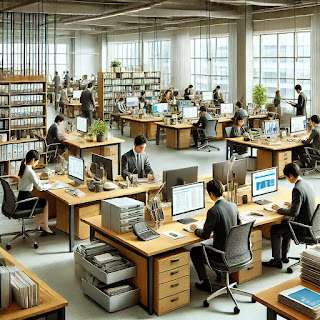最後に↓をポチっとお願いします♪
にほんブログ村
Hello, I’m Yasui, the president of a one-person company specializing in the inspection of high-pressure gas equipment.
This morning, I took my three daughters to a nearby bookstore. I had previously come across a feature on a book called More Love for Yourself: The Cute Rules of "Hapikawa", and I had a conversation with a customer about it. I wanted to read it myself so I could discuss it further, so I looked it up and found that the bookstore had it in stock. I decided to buy it. It would have been a bit embarrassing for an old guy like me to buy it alone, so I was glad my daughters were with me! (laughs)
Japanese workers are finding it easier and easier to take time off. When I first became a working adult, having a "day off" simply meant that there was no on-site work scheduled. But there was always paperwork and other tasks that needed to be done, so there wasn’t a clear boundary between work and rest.
Since my father was my boss, if I was slacking off instead of doing what needed to be done, he would scold me harshly. Looking back now, I can see that it was justified. Avoiding tasks doesn’t make them disappear; they just pile up. Whether it was good or bad, I’d often be reminded of my unfinished tasks even at the dinner table, which would push me to tackle them at night.
I might not have been the most productive worker, but at least I didn’t let work accumulate. Developing that habit early on is something I should be grateful to my father for.
Nowadays, there are people who clock out and go home even when they still have unfinished work. But is that really okay? On the other hand, there are those who stretch out their work into overtime just to increase their hours. I’m not saying that working long hours is inherently good.
In such cases, neither the company nor the customers benefit—only the individual does. Dragging out work needlessly only results in additional costs for clients.
People should be more conscious of whether their overtime work actually produces results.
For example, in a company where unpaid overtime is common, staying late means losing personal time with no benefit. That would naturally push people to finish their work quickly and efficiently.
Maybe things used to function better in the past, though unpaid overtime itself is unacceptable.
But in today’s Japan, some people try to get more overtime pay while delivering minimal results. This means that those with lower abilities end up earning more, simply because they log extra hours rather than producing actual value.
These people don’t think about what they’ve accomplished—they only think about how many hours they’ve worked. They don’t even understand their own jobs.
They neither work hard nor think critically, yet their pride remains high.
Japan is mass-producing these kinds of mediocre, ineffective workers.
They prioritize efficiency so much that their actual capabilities are alarmingly low. Their version of "efficiency" is merely what seems convenient to them, without any real understanding of other methods.
As soon as they don’t see immediate results, they abandon the effort and move on to something else.
They don’t want to fail, so rather than persist and find a breakthrough, they simply quit.
If Japan becomes overrun with people who refuse to work, what will happen to this country?
At the very least, be diligent.
Japan was respected because its people were hardworking and diligent. If we lose both of those qualities, then what positive traits will remain?
Today’s Quote
"Japanese people should be diligent and hardworking. That alone can put you among the top."
See you next time!
